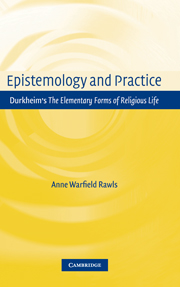Book contents
- Frontmatter
- Contents
- Acknowledgments
- Introduction
- 1 Durkheim's Outline of the Argument in the Introductory Chapter
- 2 Durkheim's Dualism: an Anti-Kantian, Anti-Rationalist Position
- 3 Sacred and Profane: the First Classification
- 4 Totemism and the Problem of Individualism
- 5 The Origin of Moral Force
- 6 The Primacy of Rites in the Origin of Causality
- 7 Imitative Rites and the Category of Causality
- 8 The Category of Causality
- 9 Logic, Language and Science
- 10 Durkheim's Conclusion Section iv: Logical Argument for Social Origin of the Categories
- Conclusion
- Bibliography
- Index
7 - Imitative Rites and the Category of Causality
Published online by Cambridge University Press: 22 September 2009
- Frontmatter
- Contents
- Acknowledgments
- Introduction
- 1 Durkheim's Outline of the Argument in the Introductory Chapter
- 2 Durkheim's Dualism: an Anti-Kantian, Anti-Rationalist Position
- 3 Sacred and Profane: the First Classification
- 4 Totemism and the Problem of Individualism
- 5 The Origin of Moral Force
- 6 The Primacy of Rites in the Origin of Causality
- 7 Imitative Rites and the Category of Causality
- 8 The Category of Causality
- 9 Logic, Language and Science
- 10 Durkheim's Conclusion Section iv: Logical Argument for Social Origin of the Categories
- Conclusion
- Bibliography
- Index
Summary
Following the first two chapters of Book III, Durkheim introduces imitative rites in the first two sections of Chapter Three. This discussion is particularly important because these are the rites that Durkheim argues create the category of causality. Therefore, particular attention will be given to the argument with regard to mimetic rites in this chapter. In the first two chapters of Book III Durkheim prepared the reader for this argument, by showing that rites in general create collective emotions and representations, even society. If he can meet objections to that argument, then he may be able to meet objections to the argument that a particular form of rites creates a particular category. Furthermore, the category in question is in a sense the category of creation, and what he has argued for two chapters is that rites create something entirely new. Durkheim has been establishing creation as a result of rites. Now he will establish that “necessary causes” are created through the performance of a particular form of rites.
First, in Section i, Durkheim describes mimetic rites, and Second, in Section ii, he explains the principle behind mimetic rites. This involves 1) a distinction between mimetic rites and magic, 2) a further criticism of empiricism, 3) an explicit examination of the idea that rites have primacy over practices, 4) a discussion of the purpose of imitative rites, 5) a discussion of their social utility, and 6) the argument that specific gestures have no inherent magical efficacy.
- Type
- Chapter
- Information
- Epistemology and PracticeDurkheim's The Elementary Forms of Religious Life, pp. 212 - 229Publisher: Cambridge University PressPrint publication year: 2005



